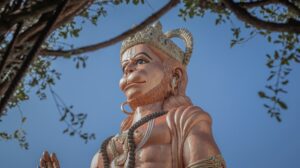Can I read Hanuman Chalisa during periods?
Devotion to Lord Hanuman knows no bounds, but what about biological ones? Many women wonder if their monthly cycle disrupts their spiritual practices. Can you still chant the powerful Hanuman Chalisa while on your period? Traditional beliefs offer some guidance, but ultimately, the answer might surprise you and empower you to connect with the divine in a deeper way. Let’s explore the cultural context and unveil practical solutions to maintain your spiritual connection with Lord Hanuman during your period.
Akhand Brahmachari Hanuman
अव्यक्तरूपो भगवान् हनूमान् मारुतात्मजः।
वीर्यवान् धर्मसंयुक्तो ब्रह्मचारी गणेश्वरः॥
The illustrious Hanuman, the son of Marut (the wind-god), possessed of unmanifested form, endowed with strength, steadfast in righteousness, and the lord of celibacy.
Hanuman, the epitome of devotion and strength, is often depicted as an Akhand Brahmachari, meaning he is eternally celibate. His celibacy signifies his undivided focus and dedication to serving Lord Rama. Understanding Hanuman’s celibate nature helps us appreciate his spiritual essence and the significance of chanting his praises through the Hanuman Chalisa.
Hanuman Chalisa: The Power of Shabar Mantra
शबरो मन्त्रो महाबलः कथितो ब्रह्माण्डे तस्मिन्।
The Shabar Mantra is said to be immensely powerful in the universe.
शब्दादिमन्त्रं यद्-वेत्ति शास्त्रे संश्रुत्य यो विभुः।
He who knows the Shabar Mantra, as stated in the scriptures, becomes all-knowing.
शब्देन विना यद्-देवं मन्त्रो मन्त्राध्यानाभ्यसात्।
Without the aid of words, through meditation on the Shabar Mantra, one attains the divine.
The Hanuman Chalisa is not just a collection of verses; it is a potent shabar mantra that holds immense spiritual power. Shabar mantras are known for their efficacy and immediate impact when chanted with sincerity and devotion. By reciting the Hanuman Chalisa, devotees invoke Hanuman’s blessings for protection, courage, and spiritual upliftment.
The Shastras and Menstruation
सप्तम्यां स्त्री सरा भवति धर्मभिः सह शुभा।
सप्तम्यां योनिनः शुद्धाः सप्तमी च सुमङ्गला॥
On the seventh day, a woman becomes pure along with religious acts. On the seventh day, the genitals are purified, and the seventh is auspicious.
The menstruation cycle has been the subject of numerous misconceptions and taboos. Often, women wonder whether they can recite mantras during their period without facing spiritual repercussions. Let’s delve into this topic and explore the nuanced understanding of mantra recitation during menstruation in Hindu scriptures and traditions.
The Misconception:
First and foremost, it’s crucial to dispel the misconception that menstruation is inherently impure or taboo in Hinduism. While certain practices may restrict women during their menstrual cycle, it’s essential to recognize that these are societal norms rather than religious injunctions. Hindu scriptures do not categorize menstruation as inherently impure or sinful.
Scriptural Perspective:
In Hindu scriptures, particularly the Vedas and Upanishads, menstruation is not deemed as spiritually polluting. Instead, the emphasis is on inner purity attained through righteous conduct and spiritual practices. However, there are specific guidelines regarding mantra recitation during menstruation, especially for those engaged in intense sadhana or spiritual practices.
Mantra Recitation During Menstruation:
1. Advanced Sadhakas: For individuals who have attained a higher state of sadhana or spiritual realization, menstruation does not hinder their spiritual practices, including mantra recitation. However, this level of spiritual attainment is rare, and only advanced practitioners can continue their practices seamlessly during menstruation.
2. Common Practitioners: Common practitioners, who haven’t reached such elevated states of spiritual advancement, are advised to refrain from mantra recitation in temples or sacred spaces during menstruation. This recommendation stems from the belief that menstrual blood represents the creative energy of the divine mother and is highly potent. Hence, it’s essential to avoid mingling this energy with sacred rituals performed in temples.
3. Mantra Diksha: If an individual has received mantra diksha (initiation) from a guru, they are permitted to continue their mantra recitation during menstruation with the guru’s permission. Mantra diksha signifies a spiritual bond between the disciple and the guru, empowering the disciple to perform spiritual practices under the guru’s guidance.
4. Without Mantra Diksha: If one has not received mantra diksha, they can still recite mantras during menstruation but are advised to do so in a relaxed setting outside the pooja room or temple. Sitting in a comfortable space, free from distractions, one can engage in mantra japa (repetition) as a form of personal spiritual practice.
Scriptural Insights:
In the Brihadaranyaka Upanishad, it is stated, “Just as the fiber of the Ishanika reed, though one, enters various plants, so does breath enter the whole human body. Similarly, prana (vital energy) pervades the entire universe. Prana is verily the same as Brahman.” This verse emphasizes the omnipresence of prana, or vital energy, in all beings and underscores the holistic understanding of spiritual practice beyond physical considerations.
तदेतद्यथा सोम्येमानि जलानि स्यांद्रव्येण प्रोष्टं करोत्येवं खलु सोम्य प्राणां वावेमानि भूतानि सर्वाणि भवन्ति।
O Somya, just as these flowing waters become one with the ocean when they reach it, their name and form are destroyed, and they become the ocean. Similarly, all beings, when they reach the Supreme Being, lose their name and form, and become one with the Supreme.
In conclusion, the question of whether one can recite Hanuman chalisa during menstruation in Hinduism requires a nuanced understanding. While menstruation itself is not considered impure, there are specific guidelines and considerations regarding mantra recitation during this time. Advanced practitioners may continue their practices seamlessly, while common practitioners are advised to exercise discretion and follow the guidance of their guru or spiritual teacher.
Ultimately, the essence of Hindu spirituality lies in inner purity, devotion, and the pursuit of self-realization, transcending external rituals and taboos. By approaching mantra recitation with reverence, mindfulness, and understanding, individuals can navigate their spiritual journey with grace and wisdom, honoring the divine within and without.









Shri Hanuman Aarti